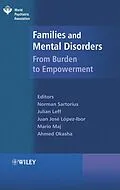According to the World Health Organization's World Health
Report 2001, one family in four worldwide has at least one member
currently suffering from a mental disorder. This disorder often
remains undiagnosed and untreated, but the behaviour of the ill
person usually has a significant impact on the quality of life of
the family and on the mental health of the other members of the
family, and generates feelings of shame, guilt, helplessness and
despair.
This book provides a comprehensive picture of currently
available evidence about the specific characteristics of the burden
on the families of people with the various mental disorders, the
coping strategies which increase or decrease this burden, the
family interventions of proven efficacy, and what should be said
and what should not be said to the relatives of people with the
various conditions.
Autorentext
Mario Maj, Department of Psychiatry, University of Naples, Italy.
Julian Leff, Institute of Psychiatry, University of London, UK.
Norman Sartorius, University of Geneva, Switzerland.
Ahmed Okasha, Ain Shams University, Cairo, Egypt.
Klappentext
The behaviour of a person suffering from a mental disorder usually has a significant impact on the quality of life and the mental health of the other family members.
Families and Mental Disorder provides a current and comprehensive picture of
- available evidence about the specific characteristics of the burden on the families
- the coping strategies which increase or decrease this burden
- family interventions of proven efficacy
- what should be said and what should not be said to the relatives of people with the various conditions
Families and Mental Disorder will be of interest to psychiatrists, psychologists, and other mental health professionals.
Zusammenfassung
According to the World Health Organization's World Health Report 2001, one family in four worldwide has at least one member currently suffering from a mental disorder. This disorder often remains undiagnosed and untreated, but the behaviour of the ill person usually has a significant impact on the quality of life of the family and on the mental health of the other members of the family, and generates feelings of shame, guilt, helplessness and despair.
This book provides a comprehensive picture of currently available evidence about the specific characteristics of the burden on the families of people with the various mental disorders, the coping strategies which increase or decrease this burden, the family interventions of proven efficacy, and what should be said and what should not be said to the relatives of people with the various conditions.
Inhalt
List of Contributors.
Preface.
The Family of the Patient with Schizophrenia (Barrowclough).
The Family of the Patient with Dementia (Brodaty).
The Family of the Patient with Major Depression (Leff).
The Family of the Patient with Bipolar Disorder (Keitner et al).
The Family of the Patient with a Severe Anxiety Disorder (Steketee and Fogler).
The Family of the Patient with an Eating Disorder (Monteleone et al).
The Family of the Child with Mental Disorder (Gowers and Bryan).
The Family of the Patient with Drug Abuse (Ghodse and Galea).
The Role of Family Organizations in Mental Health Care (Leggatt).
Research on Burden and Coping Strategies in Families of People with Mental Disorders: Problems and Perspectives (Kuipers and Bebbington).
Research on Family Interventions in Mental Disorders: Problems and Perspectives (Falloon).
From Burden to Empowerment: The Journey of Family Caregivers in India (Shankar and Rao).
Index.
